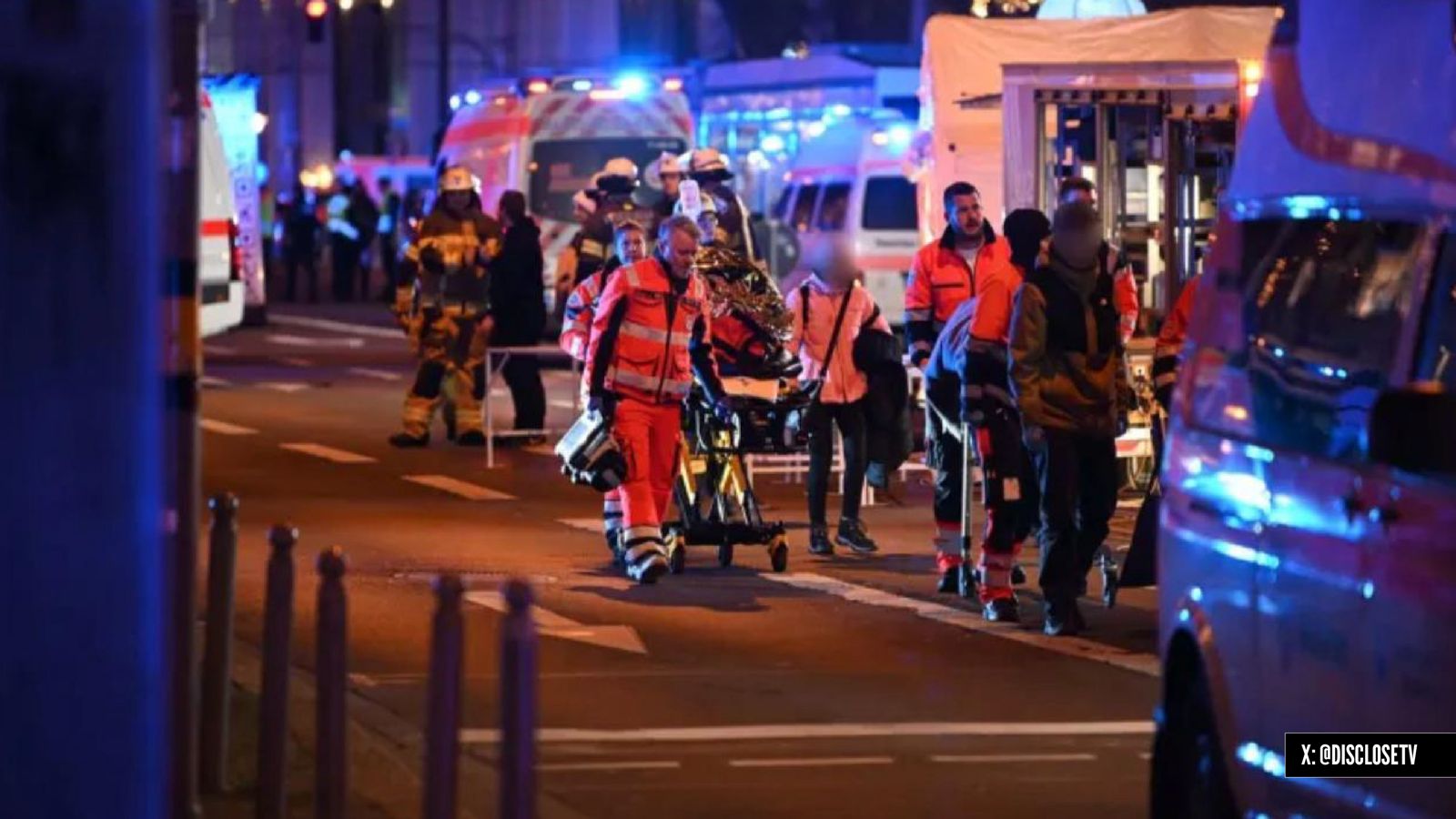
X: @disclosetv
Yesterday, after 19:04 PM (CET), a dark BMW was driven into a crowd at the Magdeburg Christmas Market in Germany. Between 60 – 80 were injured. An adult and a toddler are among the eleven confirmed casualties. Police confirmed that explosives were found in the vehicle, but had mercifully not detonated.
The perpetrator was arrested at the scene. Within hours, he was identified as a fifty-year-old Saudi Arabian national, granted indefinite leave to remain in Germany in 2006. He has lived there ever since, working as a doctor — making him, until yesterday, a poster-child for high-skilled, integrated migration that any European leader has in mind when they say, “Diversity is our strength.” As Welt reports allege, the suspect may be an anti-Islam atheist campaigner, interviewed about his work by the BBC in 2019. If so, what he hoped to achieve by mowing down a Christmas market is beyond comprehension.
Much consternation happened during the BBC’s live coverage of the attack, with two guests speculating as to if marital status or lack of job prospects might explain why a man of fifty would do such a thing. Conspicuously, the suggestion of any connection to Islam was absent. These guests also failed to explain why, prior to the mass immigration of millions of men from the Middle East, and North and Sub-Saharan Africa into Europe, attacks on Christmas markets were not commonplace. There were no mass stabbings at Christian festivals by native Dusselfdorf divorcees; nor did impoverished East Germans, out of work behind the Iron Curtain, drive cars into crowds of children. There was no need for concrete barriers around Christmas markets only a decade ago.
Rather, they are perpetrated by a particular kind of newcomer: like the 37-year-old suspect from Iraq, whose attack on the Augsburg Christmas Market in Bavaria, also involving a car, was foiled by police earlier this month. Or 29-year-old French-Algerian Chérif Chekatt, a convert to “rigorous Islam”, who killed five and injured 11 when he shot and stabbed shoppers at the Christkindelsmärik, in Strasbourg, France, in 2018. Chekatt had 27 previous convictions, and was radicalised while in prison in 2015. Only last week, a mob of Syrians took over a Christmas market in Essen, Germany, chanting “Allahu akbar” in celebration of the fall of Bashar Al Assad.
Enjoy independent, ad-free journalism - delivered to your inbox each week
Of course, motive matters, and that has yet to be detailed in full. But given precedent, it was not unreasonable to think that this was yet another Islamic terror attack in Europe. Almost eight years ago to the day, on December 19th, 2016, Tunisian jihadist Anis Ben-Mustafa Ben-Outhman Amri drove a lorry into the Christmas market beside the Kaiser Wilhelm Memorial Church at Breitscheidplatz, in Berlin. 12 people were killed, and 49 injured. Amri had procured the lorry by murdering the Polish driver, Lukasz Urban, in a hijacking. He then fled the scene, and was killed in a shootout with Italian police, after exclaiming “Allahu Akbar” and opening fire. Amri was scheduled for deportation in June, 2016, but this was delayed due to a lack of paperwork confirming his identity. He had previously broken into Italy via small boat in 2011, following the Arab Spring, and then served four years in prison for arson.
Just as news reports said, following this summer’s attack on a “Festival of Diversity” in Solingen, by a Syrian immigrant, Amri was a “failed asylum seeker.” It appears that illegal immigrants exploiting Europe’s lax refugee laws — ever since Angela Merkel announced “Wir schaffen das” — only become “failed asylum seekers” after they have killed innocent people. In the Solingen attack, a 26-year-old suspect, pseudonymised as Issa al H, is charged with stabbing two men and a woman to death, and injuring eight others. Islamic State claimed responsibility for the attack via Telegram. Issa al H had broken into Germany via Bulgaria in 2023, and evaded a scheduled deportation under the Dublin Agreement by going on the run. After he was relocated, the deportation effort was inexplicably abandoned, and he was provided taxpayer-funded asylum accommodation in Solingen.
This non-exhaustive list shows the risk posed to the populations of Europe by unfettered immigration. When the hallmarks of another Islamist attack appear, Europeans have been conditioned to jump to conclusions. But if it does transpire that this Saudi national does not fit this reliable pattern: it remains incontrovertible to say that, had this man not been in Germany, hundreds of families would not be agonising over the fate of their loved ones this Christmas. If not for mass immigration, and the appeasement of indigestible foreign ideologies through the doctrine of multiculturalism, then we would not have seen the hundreds of sexual assaults at New Years Eve celebrations in Hamburg, Frankfurt am Main, Hanover, and Cologne in 2015. We would not see ten stabbings every day in Berlin — more than half of which are committed by non-Germans. We would not see half of all welfare recipients being foreign nationals. Yet again, it takes a mass casualty event to remind us that these attacks are, almost always, a consequence of permissive government policies placing the perpetrator in the country.
As Britain’s Shadow Justice Minister, Robert Jenrick said, the solutions are simple:
End mass migration.
Revoke visas/deport those who hate us.
Give no quarter to extremists.
We don’t have to live like this.
End mass migration.
— Robert Jenrick (@RobertJenrick) December 20, 2024
Revoke visas/deport those who hate us.
Give no quarter to extremists.
We don’t have to live like this.
After the Solingen attack, Chancellor Olaf Scholz promised to resume deportation flights to Afghanistan. However, it transpired that the 28 criminals sent home were paid €1,000 each to return; and that many more “refugees” had been holidaying in Taliban-controlled Afghanistan, while claiming asylum in Germany. This broken system culminated in the collapse of the “traffic light” coalition government last week. With February’s snap election looming, insurgent populist party the AfD may campaign on a promise to deport all foreign criminals and “Imams who stand out for anti-constitutional agitation” to their nation of origin. They have already won Elon Musk’s support, who last night called for Scholz’s resignation. But it is unconscionable that so many have died while German politicians refuse to solve the problem they imported.
Angela Merkel said, in 2015, that, “If Europe fails on the question of refugees, its close connection with universal civil rights will be destroyed. It won’t be the Europe we imagine.” It’s clear that Germany, and all of Europe, have suffered long enough for her utopian delusions. And to those who say the logistics are too difficult, and enforcement of the law too illiberal, I say: “Wir shaffen das.”




Comments (2)
Only supporting or founding members can comment on our articles.